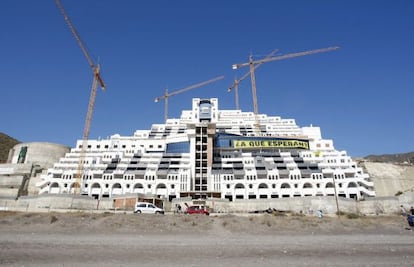Demolition of Algarrobico proves to be less than a blast for Popular Party
Environment Ministry tears up Socialist accord to raze building to the ground

When the Supreme Court ruled last March that the controversial Algarrobico hotel in Carboneras, Almería, was an illegal structure, environmentalists rubbed their hands together at the prospect of its immediate demolition. Mar Moreno, the Andalusia government’s chief of staff, said the Socialist administration was waiting for the courts to give the go-ahead to “take a shovel and knock down the building.”
However, the hand that should deliver the hammer blow is being disputed at the highest levels. Last November, in the run-up to the general election, the former Socialist government of José Luis Rodríguez Zapatero signed an agreement with its Andalusia bloc to demolish Algarrobico. But the Popular Party, which assumed power in a landslide victory, is now hoping to avoid footing the bill for reducing the hotel to a pile of rubble.
The Attorney General’s office has ruled that the central government does not have responsibility for the hotel’s demise, while the Environment Ministry claims the Socialist accord is now worthless. The government is only responsible for the public maritime-terrestrial domain — in other words, the beach. Algarrobico, while flouting the coastal protection law quite openly, also falls foul of urban planning regulations, which, under regional statutes, are the remit of the regional government or the municipality of Carboneras.
Construction on the hotel was halted in 2006 after a legal challenge by environmental groups against its building permit. The suit was upheld by an Almería court; as well as urban planning and coastal protection law infractions, the hotel is also partially built on natural parkland. However, the company that owns Algarrobico also owns some adjacent land, making demolition even more problematic.
The government has performed numerous U-turns on the matter. In 2006, then-Environment Minister Cristina Narbona approved the expropriation of the hotel, but two years later the government quashed it, when Elena Espinosa held the post. She was of the opinion that public money should not be used to expropriate a construction that had been declared illegal in the courts, and if the company behind Algarrobico was to be compensated for the loss of its license, the regional government should fund it.
Rosa Aguilar, Espinosa’s successor, announced last November, five days before the elections, that a new agreement had been reached to raze the hotel to the ground if the Supreme Court ruling was favorable. The decision was published in the official state bulletin on December 6.
However, pulling down this monument to the construction boom and flouting of environmental law that goes hand-in-hand is not going to be easy. The hotel is partially built into a mountainside on arid land that is prone to forest fires.
Tu suscripción se está usando en otro dispositivo
¿Quieres añadir otro usuario a tu suscripción?
Si continúas leyendo en este dispositivo, no se podrá leer en el otro.
FlechaTu suscripción se está usando en otro dispositivo y solo puedes acceder a EL PAÍS desde un dispositivo a la vez.
Si quieres compartir tu cuenta, cambia tu suscripción a la modalidad Premium, así podrás añadir otro usuario. Cada uno accederá con su propia cuenta de email, lo que os permitirá personalizar vuestra experiencia en EL PAÍS.
¿Tienes una suscripción de empresa? Accede aquí para contratar más cuentas.
En el caso de no saber quién está usando tu cuenta, te recomendamos cambiar tu contraseña aquí.
Si decides continuar compartiendo tu cuenta, este mensaje se mostrará en tu dispositivo y en el de la otra persona que está usando tu cuenta de forma indefinida, afectando a tu experiencia de lectura. Puedes consultar aquí los términos y condiciones de la suscripción digital.








































